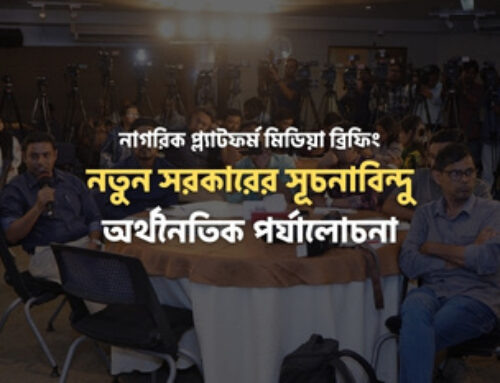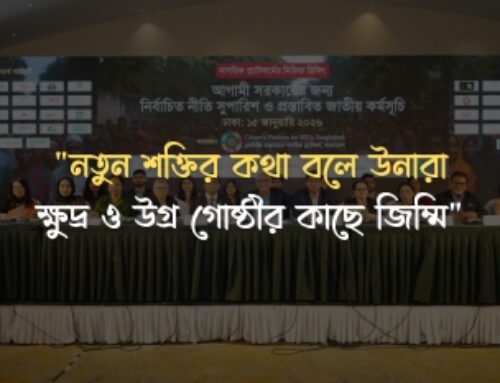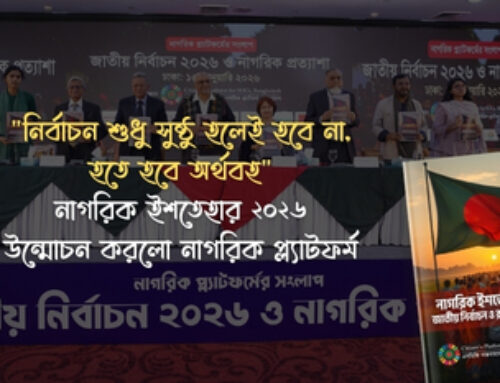
Citizen’s Platform for SDG’s, Bangladesh organised an online Ted Talk Session on Sunday, 20 February 2022. The primary objective of the session was to produce and disseminate knowledge and ideas from successful young entrepreneurs to a group of young job seekers by allowing the latter to dive deep into the emerging and dynamic demands of job markets in line with the future employment shifts. The session was conducted to highlight the practical aspects of labour market in the period of economic recovery from COVID-19 pandemic.
The need for this kind of issue-specific expert talk emerged from Citizen’s Platform’s recent analytical and empirical work on youth issues. During the last one year, the Platform had been engaged in exploring the implications of the COVID-19 pandemic on the youth community in Bangladesh, with special emphasis on various features of youth “disengagements”. Through its initiative, the Platform intends to advocate for decent youth employment during the 50th year of independence of Bangladesh.
Ms Amrita Islam, Deputy Managing Director, Picard Bangladesh Ltd. and Mr Shams Mahmud, Managing Director, Shasha Denims Ltd. were present at the session as the expert speakers.
Dr Debapriya Bhattacharya, Convenor, Citizen’s Platform for SDGs, Bangladesh and Distinguished Fellow, Centre for Policy Dialogue (CPD), was the moderator of the session. In his introductory remarks, he stated that the objective of bringing two entrepreneurs of export-oriented industries as expert speakers is to give an idea about skills demanded from organisations that have been successful in the international market.
Amrita Islam put emphasis on the fact that Bangladesh is slowly coming out of the pandemic. Hence, new job opportunities will emerge. As a result, post-pandemic workplace will be very different from that of the pre-pandemic era. In this age of globalisation and due to the interdisciplinary nature of job responsibilities, soft skills will allow a candidate outstand in the race of job seeking. However, job opportunities squeezed during the peak of the pandemic in Bangladesh.
She also sheds light on the fact that during the period of 2020-21, the labour force participation rate dropped to around 57 percent. According to her, post-pandemic workplace for the youth community can be more flexible and fairer. Talking about the skill gap in candidates, she identifies lack of a good combination of both practical and theoretical training in educational institutions and lack of confidence and leadership skills as key factors behind young people not acing their desired jobs. She emphasises that universities should collaborate with industries during their final year in order to give potential job applicants a better idea about the dynamically evolving job market. She further adds that such initiatives will help candidates to better perform in the interview board.
Shams Mahmud views the pandemic as an opportunity for the youth who are entering the workforce, since how the job seekers shape themselves during such adversity will only determine their place in the job market. Additionally, he recommends that skill development should not be directed towards employment only. One should always question oneself if his/her skills can be better used as an entrepreneur. He also emphasises the need to be aware of the local opportunities instead of focusing on opportunities that are city-centric. As a strategy to attract labour in his organisation, he discusses the importance of paying a wage higher than that is prevailing in the market. He adds that the pandemic has paved way for thinking in new ways; companies here in Bangladesh are now finally giving enough attention to drawing succession plans.
More than 100 youth participants from all over Bangladesh attended the session virtually, and over 300 viewers watched the session live on Citizen’s Platform Facebook Page. The participants directly engaged with the expert speakers through a Q&A session. Md Shahin, one of the virtual attendees, asks the speakers as to why fresh graduates are offered low wages in private sector jobs. However, in reply, Amrita Islam opines that investing after a private job is better than having no job at all.
Another attendee, Mr Shohanur Rahman Shaikat from Barguna, pointed out that in some cases, an employer requires a skill that can be received through vocational training, hence, all the years and finances spent on receiving a Bachelor’s and Master’s degree becomes unjustified. One of the common issues raised by many of the attendees is the wage scale, as youths spend a huge amount of money for a university degree, but it does not pay off with the salary offered by major established industries.
Professor Mustafizur Rahman, Distinguished Fellow, CPD, in his concluding remarks reflected on the greater responsibility of the state in promoting vocational training. He mentions that the state must widen the choice set for students at a very early age so that they can choose to pick the stream in a feasible manner. He also discusses about the importance of decentralisation in creating more job opportunities. For the candidates, he advises to get involved with extra-curricular activities to boost confidence and develop the other necessary soft skills. The session ended with mutual agreement among the speakers, moderator and the attendees that enhancing practical skill along with academic knowledge is a necessity in today’s labour market.




